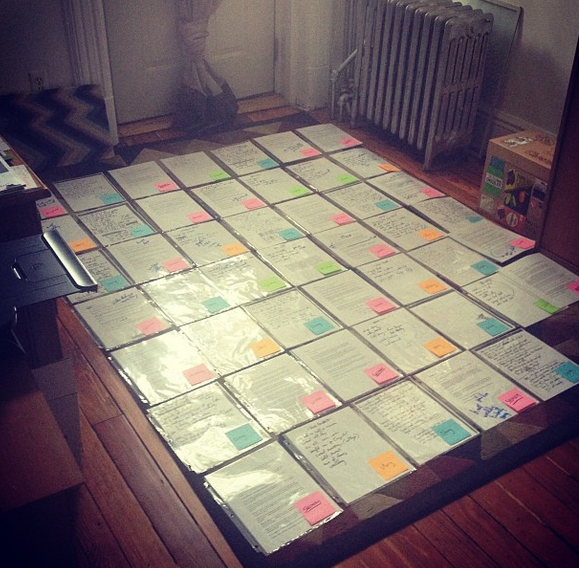

I once heard a famous comedian reveal that his
secret for writing material was, he didn’t write jokes, he wrote moments.
And
that’s why he’s so prolific.
He works modular.
In his
process, each thought is an uncategorized chunk of creative material. An objective,
portable piece content that accumulates and categorizes into its own structure.
It’s not a bit or a skit or a story or routine, it’s just a moment.
This man is onto something.
Because he knows that all ideas bring with them their own
individuality.
And as creators, we have to respect that. We have to
consciously step back from the work and think, who am I to say what this moment
might become?
Because it’s not our job to decide what to write.
Only to listen to what
wants to be written.
And in the initial stages of the creative process, we owe it
to ourselves to temporarily suspend the need to categorize. To be incrementalists.
Otherwise,
our work falls victim to premature
cognitive commitment.
This is
a term social psychologists use for people become emotionally or
intellectually bound to a course of action. It’s the mindlessness that results
after a single exposure.
For example, if we assign labels to our ideas too early––perhaps
that this new piece of writing needs to become a chapter in our next
book––we’ve just prejudged that idea’s quality and value. We’ve forced premature
cognitive commitment. And since we’ve already decided exactly what we’re making,
and our work can only be as good as that.
On the other hand, if we want our creativity to expand into
unexpected territory, to be truly prolific in the things that we made, we have
to keep the process objective for as long as possible.
We have
to work modular.
And
here’s why:
Working modular
detaches from outcomes. Which keeps us focused on the writing process, not
what the writing produces. It helps us
maintain a casual, relaxed attitude toward our material.
Working modular objectifies
our creative process. Which creates a sense of detachment and ensures we
don’t fall in love with our ideas. Which opens us to criticism and feedback and
possibility.
Working modular keeps the
creative process open ended. Which allows material to be created within an
unfinished, open loop. Which means we can always go back to add another piece
to make it richer. Because good art is never finished.
Working modular makes
it easy to work on multiple projects simultaneously. Which creates thought
bridges, subconscious connections and integrations between seemingly unrelated
ideas. Which helps us notice natural relationships and structures in our
writings.
Working modular breeds
consistency. Which helps us execute themes, so we’re less random and our work
is more a representation of our feelings and ideas. By taking a long view
approach to the creative process, we’re less derailed by rejection and more
confident in our work.
Working modular allows
our work to mature. Which allows us to remake our work as we grow and as
the world changes, keeping our creative output in permanent beta, aligning ourselves
with the flow of process and allowing the work to adapt and evolve.
In
fact, when I consider my body of work, I’ve written songs, albums, sermons, cartoons,
stories, books, speeches, articles, blogs, case studies, manifestos, training
modules, thinkmaps, creative briefs, business strategies, affirmations,
meditations, mission statements, personal constitutions, consulting programs,
educational curricula and most recently, a documentary.
But the
thing is, they all started as modules.
That’s why the granular process of adding, organizing, updating,
tweaking and fortifying our creative inventories is so exciting.
Because with every new sentence or note or moment that we write
down, we’re multiplying our intellectual reservoir and creating a constant
surplus position.
And that’s where prolificacy lives.
